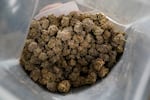
FILE: A bag filled with marijuana buds called Ice Cream Cake is displayed in the showroom of the Portland Cannabis Market in Portland, Ore., on March 31, 2023.
Eric Risberg / AP
If cannabis sales are legalized in Eastern Oregon’s largest city, it won’t come at the behest of the Hermiston City Council.
Hermiston voters banned dispensaries in 2016, but the debate was reignited after a city survey showed that taxing cannabis sales is a popular idea.
Hermiston city manager Byron Smith explained to the council in March that the city sent out a survey in 2023 while it was exploring options for raising Hermiston’s revenue. City staff didn’t consider a cannabis tax a viable option, Smith said, but still included it in the survey. When the results came back, it showed that 75% of survey takers favored the tax.
The tax’s popularity spurred staff to ask the council if they wanted to put the issue back in front of voters, although city officials were still lukewarm to the idea. Staff recommended the council take no action, Smith said.
Oregon voters legalized cannabis sales in 2014 when they passed Measure 91. The Legislature later created a carveout for communities to prohibit cannabis sales if they voted against the measure.
Dozens of rural counties and cities, including Hermiston, quickly banned cannabis sales. Hermiston also gave its voters the option to either affirm or reject the ban. In November 2016, residents voted 54% to 46% to uphold the prohibition. Since that time, cannabis has proven to be a windfall in tax revenue. Some communities have used the tax revenue from legal sales to pay for education and drug treatment programs, among other items.
Hermiston councilors supporting the ban said they did not want to go against the will of the voters, and would only support local sales if city residents brought forth an initiative petition.
“I don’t want us to be the ones that say, ‘Yeah, we think this is a good idea,’” Councilor Doug Primmer said.
Several institutions also lined up to oppose a new referendum, including the boards of the Hermiston School District and the Good Shepherd Health Care System.
Hermiston School Board member James Hurst tied cannabis sales to Measure 110, the drug decriminalization law that was recently pared back by the Legislature. He said the school board opposed any measure that would put “pot shops” closer to students.
“The financial gain expected from cannabis stores will be eaten up by the social ills it will bring about in terms of decreased productivity and harm to our kids,” he said. “The cost is too high.”
At various points in the March meeting, opponents argued that cannabis and drug decriminalization had already led to negative health outcomes, school truancy and an increase in parent disengagement. Legalizing cannabis sales would only hurt youth who could use it as a “gateway drug” to harder substances, they said.
Alberto Muñoz was one of the few members of the public to speak in favor of cannabis sales. He said failing to legalize sales would only be a boon to the black market, where people could lace cannabis with more potent substances.
“I think if we vote against this, the people that are going to be the happiest are the drug dealers here in town,” he said.
Councilor Nancy Peterson said the council did not scrutinize establishments that served alcohol the same way they looked at cannabis, noting that the council had approved several liquor licenses with little to no discussion. Although she had lost family members to alcohol addiction, she said she wanted to give Hermiston voters a chance to make their own choice on cannabis.
“Alcohol is a killer in my family. I don’t drink,” Peterson said. “But at the same time, when a liquor license comes across this (dais), my moral obligation to the citizens is bigger than that. It’s what I signed up for. To get up here and say, ‘I have morals against this other substance’ would be a little hypocritical of me.”
Other councilors were more conflicted.
Councilor Jackie Linton said the national ban on cannabis was started not as a tool for public health, but as a way of incarcerating and deporting certain groups of people. While she was against using drugs in her personal life, she said she saw friends benefit from using cannabis.
There’s evidence that other Eastern Oregon jurisdictions are starting to relax their attitudes toward cannabis sales. Grant County firmly voted against Measure 91 as it was passing statewide and the John Day City Council followed up by banning recreational cannabis sales. But John Day voters overturned the ban in 2018 and the city of 1,600 now has a recreational dispensary.
Other communities have been quicker to embrace cannabis sales. Nearby Pendleton has legalized cannabis sales since 2016. Ontario is one of the busiest cannabis markets in the state because of its proximity to Idaho, where the drug remains illegal.
Councilor Roy Barrón said he spoke with city councilors from Pendleton and Ontario and he was surprised to learn that neither had received complaints about cannabis sales.
But the pro-cannabis arguments weren’t enough to sway the council as a whole. The group voted 7-1 to take no action on the cannabis sales ban, with Peterson providing the only no vote.
Smith, the city manager, said residents interested in overturning the ban would have to collect at least 1,675 signatures by June 7 to get the issue on the November ballot through an initiative petition.